Labor Force Participation Rate
Eastern Visayas registered a Labor Force Participation Rate (LFPR) of 59.0 percent in January 2024. This placed the region’s labor force at 1.97 million persons who were either employed or unemployed out of the estimated 3.33 million population 15 years old and over.
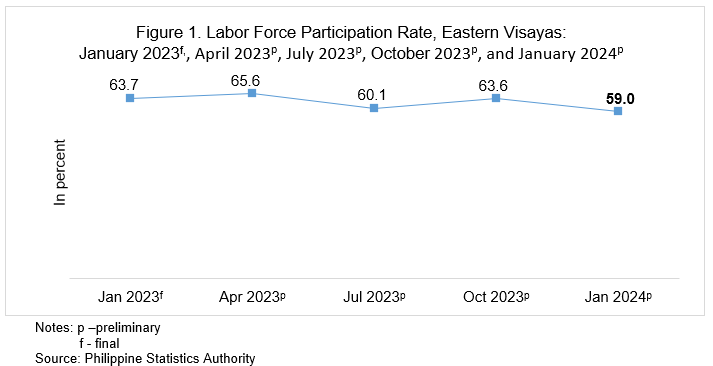
The 59.0 percent LFPR in January 2024 was lower by 4.7 percentage points than the 63.7 percent LFPR recorded in January 2023. This means that the labor force in January 2024 was lower by around 110 thousand persons than the 2.08 million persons who were in the labor force in January 2023. The 59.0 percent LFPR in January 2024 was also lower by 4.6 percentage points compared with the 63.6 LFPR in October 2023 (Figure 1).
Among regions, Eastern Visayas had the third lowest LFPR, lower by 2.1 percentage points than the 61.1 percent national estimate. SOCCSKSARGEN had the highest LFPR in January 2024 at 65.8 percent, while Bicol Region had the lowest LFPR at 55.9 percent (Figure 2).
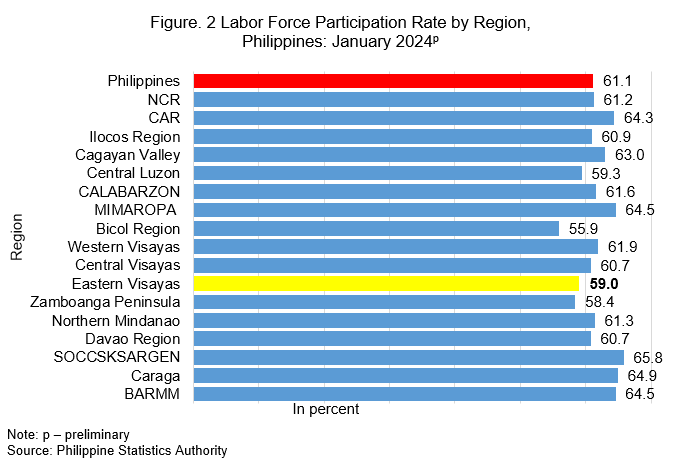
Employment Rate
The region’s employment rate in January 2024 decreased to 94.6 percent, from 96.2 percent in January 2023. The 94.6 percent employment rate translates to about 1.86 million employed persons out of the 1.97 million persons in the labor force in January 2024. This number was lower by about 137 thousand employed persons compared with the 2.00 million employed persons reported in January 2023. The number of employed persons in January 2024 was lower by around 152 thousand persons than the estimated 2.01 million employed persons in October 2023 (Figure 3).
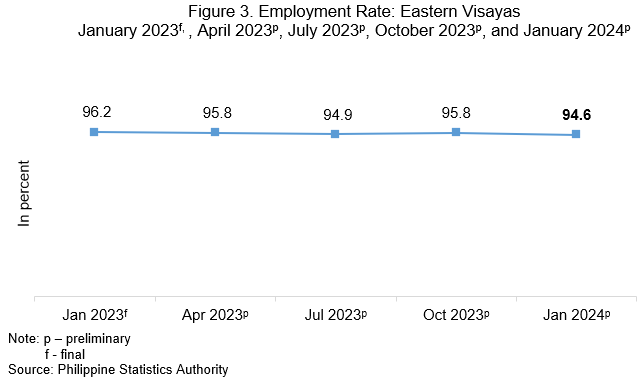
In January 2024, Eastern Visayas ranked third among regions with low employment rate, even lower by 0.9 percentage point than the 95.5 percent national estimate. Cagayan Valley and BARMM reported the highest employment rate at 97.1 percent, while CALABARZON posted the lowest employment rate at 94.1 percent (Figure 4).
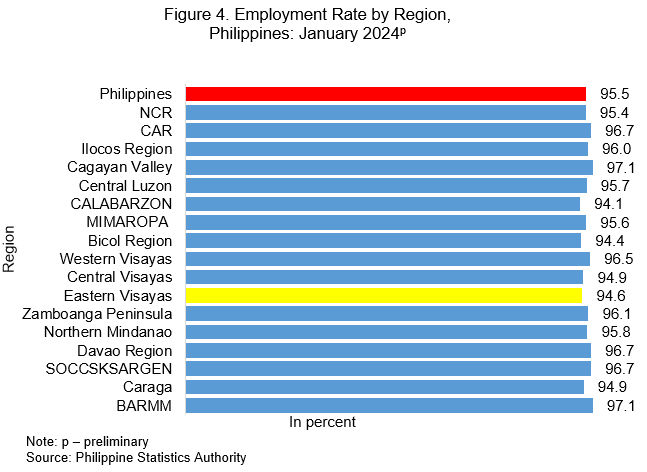
Unemployment Rate
In January 2024, the unemployment rate in Eastern Visayas increased to 5.4 percent, showing a 1.6 percentage points difference from the 3.8 percent unemployment rate in January 2023. The 5.4 percent unemployment rate was equivalent to around 106 thousand persons in the labor force who were unemployed in January 2024, higher by about 27 thousand unemployed persons compared with the 79 thousand unemployed persons recorded in January 2023. The 5.4 percent unemployment rate in January 2024 was also higher compared with the 4.2 percent unemployment rate in October 2023 which was equivalent to 89 thousand unemployed persons (Figure 5).
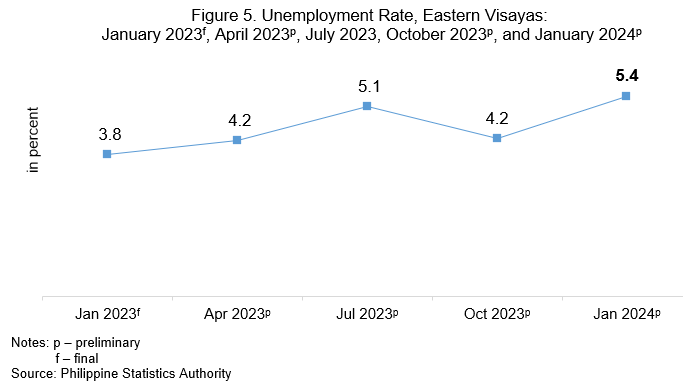
Eastern Visayas ranked third among regions with high unemployment rate. CALABARZON recorded the highest unemployment rate at 5.9 percent, while BARMM and Cagayan Valley posted the lowest unemployment rate at 2.9 percent (Figure 6).
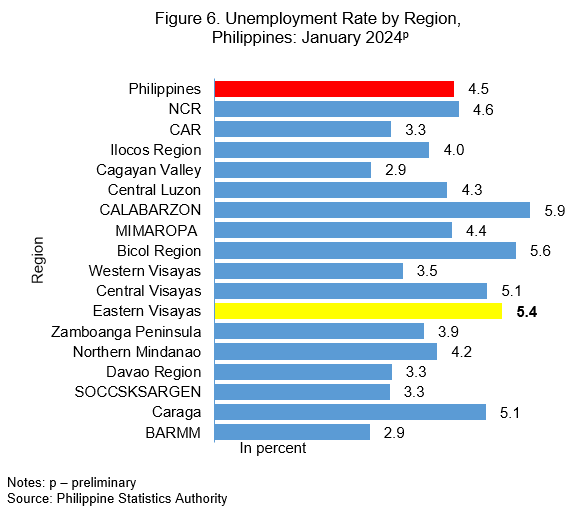
Underemployment Rate
Underemployed persons are employed persons who expressed the desire to have additional hours of work in their present job or to have an additional job, or to have a new job with longer hours of work. The underemployment rate in January 2024 was posted at 20.2 percent or about 376 thousand persons out of 1.86 million employed persons in January 2024. The 20.2 percent underemployment rate was higher by 1.4 percentage points than the 18.8 percent reported in January 2023. It was also higher by 0.4 percentage point compared with the 19.8 percent underemployment rate in October 2023 (Figure 7).
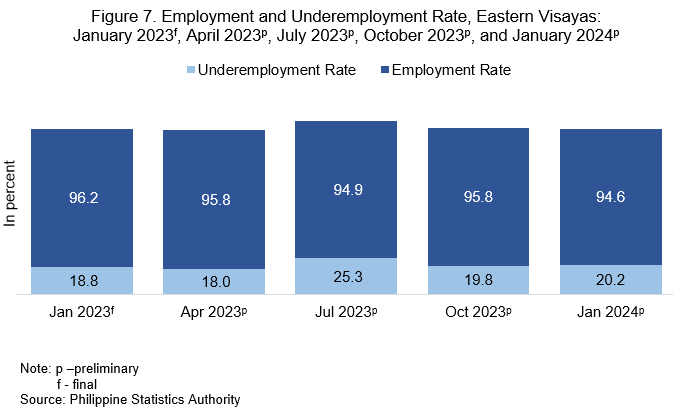
The 20.2 percent underemployment rate of Eastern Visayas was the second highest underemployment rate in January 2024. This was also higher than the 13.9 percent national estimate. SOCCSKSARGEN recorded the highest underemployment rate at 26.8 percent, while NCR recorded the lowest underemployment rate at 8.1 percent.
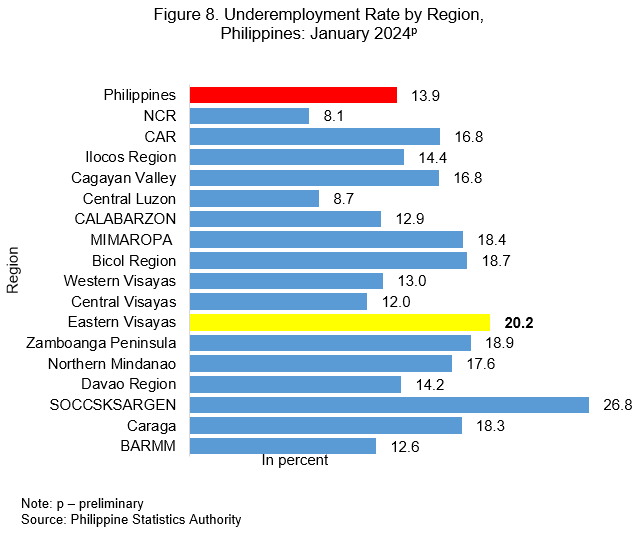
SGD. WILMA A. PERANTE
Regional Director
Technical Notes
The stability and growth of a country’s economy hinges on its ability to produce goods and services for both domestic and international use. Labor represents an important factor of production, hence, the improvement of the quality of the labor force, and efforts to make it more productive and responsive to growth are necessary for the development of the economy. A clear knowledge and understanding of the size, composition, and other characteristics of the segment of the population is a big step in this direction. A continuing supply of the data on labor force is indispensable to national and local development planning. The Labor Force Survey (LFS) gathers data on the demographic and socio-economic characteristics of the population with nationwide coverage and conducted on a quarterly and monthly mode by interviewing households.
The LFS aims to provide a quantitative framework for the preparation of plans, and formulation of policies affecting the labor market. The survey is designed to provide statistics on levels and trends of employment, unemployment, and underemployment for the country, as a whole, and for each of the administrative regions.
With regions as domain, survey operations for January 2024 LFS ran from 08 to 31 January 2024 and covered 10,752 effective sample households. Starting January 2023, the LFS adopted the updates on the Philippine Standard Geographic Code to include Bangsamoro Autonomous Region in Muslim Mindanao (BARMM).
The sampling frame used was the 2023 Geo-enabled Master Sample (GeoMS) design for household-based surveys. The 2023 GeoMS is constructed based on the results of the 2020 Census of Population and Housing (2020 CPH). The LFS adopts recent developments in statistical methodology/processes and in the education system.
Enumeration is a highly complex operation, and it may happen that reported/encoded entries during data collection may have some omissions, and implausible/inconsistent entries. During the interview, embedded editing was activated and errors/inconsistent entries were detected by the program. Editing was also done using Computer Aided Field Editing (CAFE) program after every interviewed household to ensure completeness and consistency of encoded entries.
The reference period for this survey is the “past week” referring to the past seven (7) days preceding the date of visit of the enumerator or the interviewer.
“Population 15 Years Old and Over” refers to the number of population 15 years old and over excluding overseas workers. “In the Labor Force” or “Economically Active Population” refers to persons 15 years old and over who are either employed or unemployed in accordance with the following definitions:
1. Employed persons include all those who, during the reference period are 15 years old and over as of their last birthday, and are reported either:
At work, i.e., those who do any work even for one hour during the reference period for pay or profit, or work without pay on the farm or business enterprise operated by a member of the same household related by blood, marriage, or adoption; or
With a job but not at work, i.e., those who have a job or business but are not at work because of temporary illness or injury, vacation, or other reasons. Likewise, persons who expect to report for work or to start operation of a farm or business enterprise within two weeks from the date of the enumerator’s visit are considered employed.
2. Underemployed persons include all employed persons who express the desire to have additional hours of work in their present job, or an additional job, or to have a new job with longer working hours. Visibly underemployed persons are those who work for less than 40 hours during the reference period and want additional hours of work.
3. Unemployed persons include all those who, during the reference period, are 15 years old and over as of their last birthday, and reported as persons:
Without work, i.e., had no job or business during the reference period;
Currently available for work, i.e., were available and willing to take up work in paid employment or self-employment during the reference period, and/or would be available and willing to take up work in paid employment or self-employment within two weeks after the interview date; and
Seeking work, i.e., had taken specific steps to look for a job or establish a business during the reference period, or
Not seeking work due to the following reasons: (1) fatigued or believed no work available, i.e., discouraged workers; (2) awaiting results of previous job application; (3) temporary illness or disability; (4) bad weather; and/or (5) waiting for rehire or job recall.
d. Not seeking work due to the following reasons: (1) fatigued or believed no work available, i.e., discouraged workers; (2) awaiting results of previous job application; (3) temporary illness or disability; (4) bad weather; and/or (5) waiting for rehire or job recall.
4. Persons Not in the Labor Force are persons 15 years old and over who are neither employed nor unemployed according to the definitions mentioned. Those not in the labor force are persons who are not looking for work because of reasons such as housekeeping, schooling and permanent disability. Examples are housewives, students, persons with disability, or retired persons.

